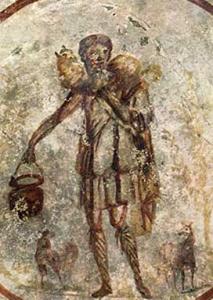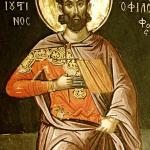[quotation marks were removed from most citations, because they were causing the text to do very strange things]
“Please Hit ‘Subscribe’”! If you’ve received benefit from this or any of my 4,500+ articles, please follow this blog by signing up (email address) on the sidebar to the right, above the icon bar, “Sign Me Up!”: to receive notice when I post a new blog article. This is the equivalent of subscribing to a YouTube channel. Please also consider following me on Twitter / X and purchasing one or more of my 55 books. All of this helps me get more exposure and concretely supports my full-time apologetics work. Thanks so much and happy reading!
*****
. . . all things become plain to His elect, that He may bestow on them the blessing which He has promised them, with much glory and joy, if only they shall keep the commandments of God which they have received in great faith. (Bk. I, Vision 1, ch. 3)
You will tell, therefore, those who preside over the Church, to direct their ways in righteousness, that they may receive in full the promises with great glory. Stand steadfast, therefore, you who work righteousness, and doubt not, that your passage may be with the holy angels. (Bk. I, Vision 2, ch. 2)
But you are saved, because you did not depart from the living God, and on account of your simplicity and great self-control. These have saved you, if you remain steadfast. And they will save all who act in the same manner, and walk in guilelessness and simplicity. Those who possess such virtues will wax strong against every form of wickedness, and will abide unto eternal life. Blessed are all they who practice righteousness, for they shall never be destroyed. (Bk. I, Vision 2, ch. 3)
Those, she said, which go into the building without being polished, are those whom God has approved of, for they walked in the straight ways of the Lord and practiced His commandments. But who are those who are in the act of being brought and placed in the building? They are those who are young in faith and are faithful. But they are admonished by the angels to do good, for no iniquity has been found in them . . . (Bk. I, Vision 3, ch. 5)
They are the sons of iniquity, and they believed in hypocrisy, and wickedness did not depart from them. For this reason they are not saved, since they cannot be used in the building on account of their iniquities. (Bk. I, Vision 3, ch. 6)
. . . he will restrain himself from all evil works, believing that, if he restrain himself from all evil desire, he will inherit eternal life . . . For from Faith arises Self-restraint; from Self-restraint, Simplicity; from Simplicity, Guilelessness; from Guilelessness, Chastity; from Chastity, Intelligence; and from Intelligence, Love. The deeds, then, of these are pure, and chaste, and divine. Whoever devotes himself to these, and is able to hold fast by their works, shall have his dwelling in the tower with the saints of God. (Bk. I, Vision 3, ch. 8)
. . . the mercy of the Lord, who has dropped His righteousness down upon you, that you may be justified and sanctified from all your iniquity and depravity . . . (Bk. I, Vision 3, ch. 9)
You have escaped from great tribulation on account of your faith, and because you did not doubt in the presence of such a beast. . . . If then you prepare yourselves, and repent with all your heart, and turn to the Lord, it will be possible for you to escape it, if your heart be pure and spotless, and you spend the rest of the days of your life in serving the Lord blamelessly. (Bk. I, Vision 4, ch. 2)
. . . those elected by God to eternal life will be spotless and pure. (Bk. I, Vision 4, ch. 3)
**
Put on a holiness in which there is no wicked cause of offense, but all deeds that are equable and joyful. Practise goodness; and from the rewards of your labours, which God gives you, give to all the needy in simplicity, not hesitating as to whom you are to give or not to give. Give to all, for God wishes His gifts to be shared among all. . . . He, then, who gives is guiltless. For as he received from the Lord, so has he accomplished his service in simplicity, not hesitating as to whom he should give and to whom he should not give. This service, then, if accomplished in simplicity, is glorious with God. He, therefore, who thus ministers in simplicity, will live to God. (Bk. II, Commandment 2)
And I said, Sir, I feel that life has come back to me in listening attentively to these commandments; for I know that I shall be saved, if in future I sin no more.
And he said, You will be saved, you and all who keep these commandments.
(Bk. II, Commandment 4, ch. 3)
I should like, sir,
said I, to know the power of anger, that I may guard myself against it.
And he said, If you do not guard yourself against it, you and your house lose all hope of salvation. Guard yourself, therefore, against it.
(Bk. II, Commandment 5, ch. 1)
This commandment exhibits the deeds of faith, . . . doing them you may live to God. (Bk. II, Commandment 6, ch. 2)
Fear,
said he, the Lord, and keep His commandments. [Ecclesiastes 12:13] For if you keep the commandments of God, you will be powerful in every action, and every one of your actions
. . . Fear, then, the Lord, and you will live to Him, and as many as fear Him and keep His commandments will live to God.
Why,
said I, sir, did you say in regard to those that keep His commandments, that they will live to God?
Because,
says he, all creation fears the Lord, but all creation does not keep His commandments. They only who fear the Lord and keep His commandments have life with God; but as to those who keep not His commandments, there is no life in them.” (Bk. II, Commandment 7)
And tell me, sir, say I, the nature of the good deeds, that I may walk in them and wait on them, so that doing them I can be saved. Listen, says he, to the good deeds which you ought to do, and in regard to which there is no self-restraint requisite. First of all there is faith, then fear of the Lord, love, concord, words of righteousness, truth, patience. Than these, nothing is better in the life of men. If any one attend to these, and restrain himself not from them, blessed is he in his life. Then there are the following attendant on these: helping widows, looking after orphans and the needy, rescuing the servants of God from necessities, the being hospitable — for in hospitality good-doing finds a field — never opposing any one, the being quiet, having fewer needs than all men, reverencing the aged, practising righteousness, watching the brotherhood, bearing insolence, being long-suffering, encouraging those who are sick in soul, not casting those who have fallen into sin from the faith, but turning them back and restoring them to peace of mind, admonishing sinners, not oppressing debtors and the needy, and if there are any other actions like these. Do these seem to you good? says he. For what, sir, say I, is better than these? Walk then in them, says he, and restrain not yourself from them, and you will live to God. Keep, therefore, this commandment. If you do good, and restrain not yourself from it, you will live to God. All who act thus will live to God. And, again, if you refuse to do evil, and restrain yourself from it, you will live to God. And all will live to God who keep these commandments, and walk in them. (Bk. II, Commandment 8)
Now I say to you, If you do not keep them, but neglect them, you will not be saved, nor your children, nor your house, since you have already determined for yourself that these commandments cannot be kept by man. (Bk. II, Commandment 12, ch. 3)
**
Have a care, then, you who serve the Lord, and have Him in your heart, that you work the works of God, remembering His commandments and promises which He promised, and believe that He will bring them to pass if His commandments be observed. Instead of lands, therefore, buy afflicted souls, according as each one is able, and visit widows and orphans, and do not overlook them; and spend your wealth and all your preparations, which you received from the Lord, upon such lands and houses. For to this end did the Master make you rich, that you might perform these services unto Him; . . . work your own work, and you will be saved. (Bk. III, Similitude 1)
So also poor men interceding with the Lord on behalf of the rich, increase their riches; and the rich, again, aiding the poor in their necessities, satisfy their souls. Both, therefore, are partners in the righteous work. He who does these things shall not be deserted by God, but shall be enrolled in the books of the living. (Bk. III, Similitude 2)
Keep this flesh pure and stainless, that the Spirit which inhabits it may bear witness to it, and your flesh may be justified. (Bk. III, Similitude 5, ch. 7)
. . . the commandments . . . are excellent, and powerful, and glorious, and able to save a man’s soul, . . . (Bk. III, Similitude 6, ch. 1)
They did not, however, depart from God, but remained in the faith, although not working the works of faith. (Bk. III, Similitude 8, ch. 9)
What, then, sir, I said, if these men, being such as they are, repent and put away their desires after these women, and return again to the virgins, and walk in their strength and in their works, shall they not enter into the house of God? They shall enter in, he said, if they put away the works of these women, and put on again the strength of the virgins, and walk in their works. (Bk. III, Similitude 9, ch. 14)
And all who follow out his commands shall have life, and great honour with the Lord. (Bk. III, Similitude 10, ch. 2)
Whoever, therefore, shall walk in these commandments, shall have life, and will be happy in his life; but whosoever shall neglect them shall not have life, and will be unhappy in this life. . . . Do good works, therefore, you who have received good from the Lord; lest, while you delay to do them, the building of the tower be finished, and you be rejected from the edifice . . . (Bk. III, Similitude 10, ch. 4)
***
Related Reading
*
*
***
*
Practical Matters: Perhaps some of my 4,600+ free online articles (the most comprehensive “one-stop” Catholic apologetics site) or fifty-five books have helped you (by God’s grace) to decide to become Catholic or to return to the Church, or better understand some doctrines and why we believe them.
Or you may believe my work is worthy to support for the purpose of apologetics and evangelism in general. If so, please seriously consider a much-needed financial contribution. I’m always in need of more funds: especially monthly support. “The laborer is worthy of his wages” (1 Tim 5:18, NKJV). 1 December 2021 was my 20th anniversary as a full-time Catholic apologist, and February 2022 marked the 25th anniversary of my blog.
PayPal donations are the easiest: just send to my email address: [email protected]. Here’s also a second page to get to PayPal. You’ll see the term “Catholic Used Book Service”, which is my old side-business. To learn about the different methods of contributing (including Zelle), see my page: About Catholic Apologist Dave Armstrong / Donation Information. Thanks a million from the bottom of my heart!
*
***
Photo Credit: Jesus as the Good Shepherd, made around 300 AD in the Roman catacombs [public domain / Wikimedia Commons]
Summary: The Shepherd of Hermas, a remarkable Christian treatise dated c. 150 AD, offers extraordinary evidence that the early Church’s theology of salvation was “Catholic.”














